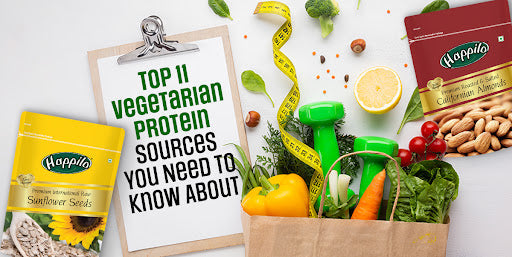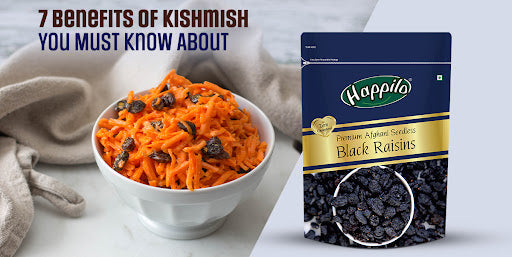
What Are Proteins?
Proteins are known to be one of the most vital elements of our everyday diet. It is a macronutrient generally absorbed through a balanced meal. This diet can be a combination of plant or animal based products. However, if you want to abstain from eating meat, fish, eggs etc, you can compensate your protein intake with a meal consisting of only Indian vegetarian protein sources.
Proteins are known to be one of the most vital elements of our everyday diet. It is a macronutrient generally absorbed through a balanced meal. This diet can be a combination of plant or animal based products. However, if you want to abstain from eating meat, fish, eggs etc, you can compensate your protein intake with a meal consisting of only Indian vegetarian protein sources.
Proteins for Vegetarians
A large part of the Indian population is vegetarian. Although there are many great health benefits to following a vegan or vegetarian diet, it sometimes may fall short of foods with high levels of protein and other vital nutrients necessary for your body. However, over the years, there has been a greater following for a plant-based diet comprising many Indian vegetarian protein sources. This has led to more innovative and creative ways to incorporate proteins and other enriching ingredients into your everyday lifestyle and meal.

Benefits of a High Protein Diet
1. Regulates Your Appetite
Foods enriched with proteins are the most filling. This happens because protein helps reduce levels of Ghrelin, a hunger hormone and while simultaneously boosting levels of Peptide YY, the hormone that makes you feel. This process is one of the main function of protein that helps you eat the right amounts and keeps hunger levels in check. Proteins are also responsible for hormone regulation and production
2. Strengthens Your Body
Protein is a nutrient that helps strengthen your muscle and bone. The Amino Acids present in proteins help repair any kind of wear and tear or damage of the muscle tissues, especially after exercise. Additionally, one of the other benefits of a high protein diet is to also protect your body externally. This happens in the form of Collagen, which helps maintain your skin cells and Keratin which helps in smoothing your hair and nails.
3. Improves Digestion
One of the main function of protein is to aid in easy digestion. The protein consumed every day contributes to creating enzymes, which help break down food, and make new chemicals and cells.
Now that we have established how important proteins are for the human body, let's take a look at the various Indian vegetarian protein sources.
Top 11 Indian Vegetarian Protein Sources
Let's dive into the 11 essential Indian vegetarian protein sources you can include in your everyday meal:

1. Lentils
Lentils are a staple in Indian households. Dal is one of the very popular and common Indian protein foods, consumed on a very regular basis. Lentils are an excellent source of protein and also high in potassium. Various studies have proven that Lentils can help lower cholesterol levels and diabetes. Apart from its nutritional value and numerous health benefits, lentils can be consumed in many different forms from soups to salads to desserts! Moreover, lentils are of many different types namely yellow gram, pigeon peas, moong beans, split peas, and so much more. This variety of lentils allows you to experiment with flavours, making it one of the most versatile Indian vegetarian protein sources.
2. Nuts
Nuts are little protein powerhouses that are one of the oldest and healthiest food groups known to mankind, with many different benefits. They also comprise other vital nutrients such as fibre, magnesium, & Vitamin E. High protein nuts should be an important part of your diet on a daily basis. Since the origin of different nuts differs from one to another, they make for an interesting kind of food. For instance, some high protein nuts grow on trees such as Almonds, Cashews, Pecans, Macadamia, Walnuts, and Pistachios whereas Peanuts or Groundnuts are grown underground, and some on bushes like Hazelnuts. Read more on how consuming nuts benefit on a daily basis improves your health and lifestyle!
Just like other Indian vegetarian protein sources, nuts by themselves are a great type of snack to munch on, but they can also be a delicious addition of flavour to your food as a crunchy topping to your protein rich salad, soups, and cereal, or in the form of healthy protein bars or even in and as confectionary. So take your pick from any of these and go nuts! (no pun intended!)
3. Seeds
Seeds are known to be plant-based superfoods enriched in minerals, essential vitamins, fibre, and of course proteins. Because of its high nutritional value, seeds are also great for weight loss.
Just like nuts, seeds are also extremely easy to consume. Nuts and seeds are sometimes used interchangeably. This could be because both nuts and seeds with high protein have similar properties. However there is a difference, and that is that all nuts are seeds but all seeds are not necessarily nuts.
Seeds for weight loss such as flax seeds, basil seeds, sunflower seeds, pumpkin seeds, chia seeds,melon seeds, etc. can be added as a garnish to any meal such as a protein rich salad or even as an ingredient to your daily morning smoothies. Apart from being enriched with protein, seeds
Fun fact: Some of these seeds also make excellent face packs and can do wonders for your skin and acne!
4. Tofu
Tofu is a lean veg protein that is made from pressed soybean curds. It is naturally gluten-free and an extremely popular plant-based product, making it one of the best Indian vegetarian protein sources. Additionally, it is a high source of iron and calcium as well.
Over the years, Tofu gained popularity in veganism as it contains no animal by-products. It is also widely used as a substitute for cubed chicken or meat, making it easier for even meat lovers to add it to their diets. Tofu is a very common ingredient in many Asian cuisines and a great addition to your protein rich salad or a grain bowl!
5. Beans
Beans are one of the Indian protein foods that commonly include chickpeas, black-eyed beans, pinto beans, kidney beans, black beans etc. These are extremely popular in Indian, Mexican and even Middle Eastern cuisines.
Reportedly, the inclusion of beans in your daily diet has multiple advantages such as lower cholesterol, reducing blood sugar levels, highly fibrous and a great source of Vitamin B.
6. Oats
Oats are the greatest powerhouse food with all the essential fats, protein and fibre you need! It is quick, easy and delicious all at once and makes great breakfast or lunch meals. Soaking oats overnight is also a great meal prep idea. Just like most Indian vegetarian protein sources, the beauty of oats is that you can really experiment in many ways. For instance oats are commonly consumed with high protein nuts and fruits, with lentils in the form of Khichdi and if you are looking for a sweet treat then you can also indulge in some guilt free Oats Kheer from our blog on 4 easy Indian sweets to make at home. So what is your favourite way to eat your oats?
7. Vegetables
Protein rich vegetables in India are one of the most popular Indian vegetarian protein sources. However, this balanced combination of “dal and sabzi” in Indian cooking has become a staple and common concept even around the world.
India is known to be one of the largest vegetable producers in the world and so you can only imagine the variety of high protein vegetables it offers. Some common protein rich vegetables in India are greens such as spinach, asparagus, artichokes, broccoli, green peas, and other vegetables like sweet potatoes, mushrooms etc. The beauty of these vegetables? They blend in with any cuisine and can be eaten in any form, such as an Indian sabzi, Thai stir-fry or can be tossed in a salad or grain bowl! Eating vegetables has never been more fun!
8. Fruits
Most often we forget that just like protein rich vegetables in India or nuts and seeds with high protein, fruits also contribute to your daily protein intake if consumed rightly. Fruits such as guavas, apricots, avocado, bananas, berries and also citrus fruits like grapefruit or oranges are a high source of proteins along with important vitamins and minerals.
A daily fruit intake is encouraged to keep proteins and other nutrients balanced while also giving your body the hydration it needs. These also go well with cereal or as a beverage.
9. Protein rich Dried Fruits
If you have a sweet tooth but are trying to be on a strict healthy diet, dried fruits are a great way to spruce up a bland salad! Consuming these in its natural form is also a great way to manage your daily protein intake. Protein rich dry fruits like prunes, dried apricots, dates, dried figs, pecans, and raisins can help you enrich your diet with the right amount of iron and magnesium as well. Additionally, these make for excellent snacks too!
10. Protein powder
Protein powders or supplements are usually not a very common way to boost your protein intake. It is generally consumed in addition to a healthy balanced diet and workout. These powders are not recommended to every individual because of their concentrated nature, however, if you are training or muscle building and cannot meet your daily protein requirement, you can consume these with milk or a smoothie!
11. Healthy Protein Bars
Protein bars are like goodness in a wrapper! They have the sweetness of chocolate and the nutrients of a properly balanced meal. So if you are running late in the morning or need something to munch on between meals or a pre/post-workout snack, a protein bar is your best friend! It is packed with protein-based ingredients that help you maintain energy levels throughout the day. They also really help maintain your weight, muscle mass and metabolism.
Frequently Asked Questions On Indian Vegetarian Protein Sources
Q1. What is the average protein intake per day for an adult?
The average protein intake per day usually differs between males and females. A male is required to consume about 56 grams of protein and a female 46 grams and a pregnant woman 70 grams of protein.
Q2. What are some other lean veg proteins other than tofu?
Most foods that are derived from soybeans are great sources of lean veg protein such as soy milk and miso. Other lentils and legumes such as pinto beans, chickpeas or hummus, lima beans and black beans are other high protein sources too.
Q3. How do consuming protein rich dry fruits help in weight loss?
Dry fruits have extremely high nutritional value. Replacing your regular snacks with protein rich dry fruits such as prunes, dried cranberries, and figs helps your body absorb more proteins and less fat and carbs. This aids in building your metabolism and helps regulate your hunger, thereby helping you lose weight. Also read our blog Dry Fruits: Debunking the sugar myth!




Leave a comment
All comments are moderated before being published.
This site is protected by hCaptcha and the hCaptcha Privacy Policy and Terms of Service apply.